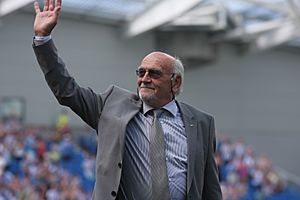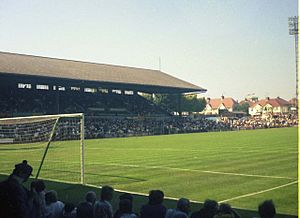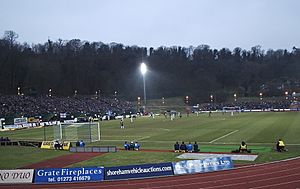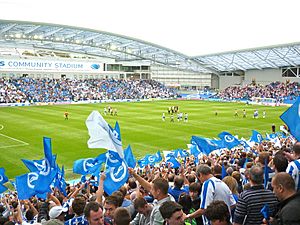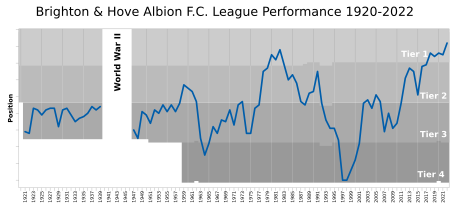- This page was last modified on 17 October 2025, at 10:18. Suggest an edit.
Brighton & Hove Albion F.C. facts for kids
This page is about the men's professional football team. For the women's team associated to the same club, see Brighton & Hove Albion W.F.C..
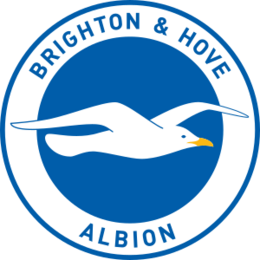 |
||||
| Full name | Brighton & Hove Albion Football Club | |||
|---|---|---|---|---|
| Nickname(s) |
|
|||
| Short name | Brighton | |||
| Founded | 24 June 1901 | |||
| Ground | Falmer Stadium | |||
| Capacity | 31,876 | |||
| Owner | Tony Bloom | |||
| Chairman | Tony Bloom | |||
| Head coach | Fabian Hürzeler | |||
| League | Premier League | |||
| 2018–19 | Premier League, 17th of 20 | |||
|
||||
Brighton & Hove Albion Football Club, often called Brighton, is a professional football team. They are based in Brighton and Hove, England. The club plays in the Premier League, which is the top football league in England. Since 2011, their home stadium has been Falmer Stadium. Before that, they played at the Goldstone Ground for many years.
Brighton was started in 1901. They first played in the Southern League. In 1920, they joined the Football League. Between 1979 and 1983, they played in the top league, the First Division. They even reached the 1983 FA Cup final in 1983, but lost to Manchester United. They were moved down to a lower league that same season.
In the late 1990s, Brighton faced money problems. They almost dropped out of the Football League in 1997. A new group took over the club and saved it. Brighton then moved up two leagues in 2001 and 2002. In 2011, they moved into the Falmer Stadium. This was after 14 years without a permanent home.
In the 2016–17 season, Brighton finished second in the EFL Championship. This meant they were promoted to the Premier League. It was their first time in the top league in 34 years. In the 2022–23 season, Brighton finished sixth in the Premier League. This was their highest ever finish. They also qualified for the UEFA Europa League, playing in a European competition for the first time.
Brighton's nickname is the Seagulls. They have mostly worn blue-and-white striped shirts. Their biggest rivalry is with Crystal Palace. This rivalry started in the 1970s because of tough competition between the teams.
Contents
Club History
Early Years and First Success (1901–1972)
Brighton & Hove Albion F.C. was founded in 1901. In 1920, they joined the new Third Division of the Football League. Before that, they were in the Southern League. In 1910, they won their only national trophy, the FA Charity Shield. They beat Aston Villa, who were the Football League champions.
Brighton stayed in the Third Division South until the 1957–1958 season. They won the title that year and moved up to the Second Division. They stayed in the Second Division until 1962. Then they were moved down two years in a row, ending up in the Fourth Division in 1963. They won the Fourth Division title in 1964–1965. In 1972, they finished second in the Third Division and moved back to the Second Division.
The Mike Bamber Era (1972–1987)
Mike Bamber was Brighton's chairman from 1972 to 1983. He brought famous managers like Brian Clough and Alan Mullery to the club. In 1979, under Mullery, Brighton was promoted to the First Division. This was the top league in England.
The 1982–83 season started with mixed results. Manager Mike Bailey was replaced by Jimmy Melia in December 1982. Brighton was moved down from the First Division in 1983, finishing last.
Despite being moved down, Brighton reached their first FA Cup final that season. They drew 2–2 with Manchester United in the first match. Gordon Smith and Gary Stevens scored for Brighton. In the replay, Manchester United won 4–0.
Challenges and a New Beginning (1987–1997)
Brighton was moved down to Division Three in 1987, but came back up the next season. In 1991, they lost a play-off final at Wembley. The next season, they were moved down again to the new Division Two. In 1996, they went down to Division Three.
The club had serious money problems. The directors decided to sell the Goldstone Ground to pay off debts. Manager Jimmy Case was fired after a very bad start to the 1996–97 season. Steve Gritt became the new manager. Brighton's performance got better, but they lost two points because fans protested the stadium sale. A fan named Dick Knight took control of the club in 1997. He led the effort to remove the old board.
On the last day of the season, Brighton played Hereford United. Brighton needed to win or draw to stay in the league. Brighton's Kerry Mayo scored an own goal, making it look like Brighton would lose. But Robbie Reinelt scored a late goal, and Brighton stayed in the league. Hereford United was moved down instead.
The Withdean Era and New Ownership (1997–2011)
The Goldstone Ground was sold in 1997. Brighton had to play 70 miles away at Gillingham's Priestfield Stadium for two seasons. Micky Adams became manager in 1999. For the 1999–2000 season, Brighton started playing at Withdean Stadium. This was an athletics track in Brighton that was changed for football.
The 2000–01 season was Brighton's first successful one in 13 years. They won the Division Three title and were promoted. Adams left in 2001, and Peter Taylor took over. Brighton continued their good form and won the Division Two title. This was their second promotion in a row. Just five years after almost going out of business, Brighton was only one division away from the Premier League.
In May 2009, Tony Bloom became Brighton's chairman. He helped get £93 million to build the new Falmer Stadium. He also bought 75% of the club.
Brighton's last season at Withdean was 2010–11. They won League One under manager Gus Poyet. The next season, Brighton changed their club badge. The new badge was like the one used from the 1970s to the 1990s. This showed the club was returning to a proper home stadium.
New Stadium and Premier League Promotion (2011–2017)
The Falmer Stadium hosted its first league match on the opening day of the 2011–12 season. Brighton played Doncaster Rovers, the same team they played in their last game at the Goldstone. Brighton won 2–1.
In the 2012–13 season, Brighton finished 4th. They lost in the play-off semi-finals to Crystal Palace. Manager Gus Poyet was later fired and replaced by Óscar García.
On the last day of the 2013–14 season, Brighton beat Nottingham Forest 2–1. A late goal from Leonardo Ulloa secured a 6th-place finish. After losing to Derby County in the play-offs, García resigned. Sami Hyypiä became manager for the 2014–15 season but left after four months. Chris Hughton took over.
In the next season, Brighton aimed for promotion again. They had a 21-game unbeaten run. On the final day, Brighton needed to beat Middlesbrough to get promoted to the Premier League. A 1–1 draw meant they finished 3rd and went into the play-offs. They lost to Sheffield Wednesday. This was their third play-off semi-final loss in four seasons.
Brighton started the 2016–17 season with an 18-match unbeaten run. They were at the top of the league for much of December and January. They stayed in the automatic promotion spots for most of the season. Brighton secured promotion to the Premier League after a 2–1 win against Wigan Athletic on April 17, 2017.
Life in the Top Division (2017–Present)
Brighton's first season in the Premier League was successful. They finished 15th, staying clear of the relegation zone. They had important wins against Arsenal and Manchester United.
The second season in the top league was harder. They just avoided being moved down, finishing 17th. In the FA Cup, Brighton reached the semi-finals for the first time since 1983. They lost 1–0 to Manchester City. Chris Hughton was fired after the season due to poor results.
Graham Potter, from Swansea City, became the new head coach. He signed a four-year contract. In his first two seasons, Brighton finished 15th and 16th. This meant they would play a fifth season in the Premier League. This was longer than their previous time in the top flight (1979-1983).
The 2021–22 season saw Brighton finish ninth in the Premier League. This was their highest ever finish in English top-flight football. They earned a record 51 points. In September 2022, Potter left to become head coach of Chelsea.
On September 18, 2022, Brighton announced Roberto De Zerbi as their new head coach. The league paused for the 2022 FIFA World Cup. Brighton midfielder Alexis Mac Allister helped Argentina win the tournament. He even started and assisted a goal in the final.
Brighton reached their second FA Cup semi-final in four seasons. They lost to Manchester United on penalties after a 0–0 draw. On May 21, 2023, Brighton qualified for European football for the first time. They beat Southampton 3–1. Three days later, a 1–1 draw with Manchester City secured their spot in the 2023–24 UEFA Europa League group stage. Brighton finished the season in sixth place with a record 62 points.
On December 14, 2023, Brighton won their UEFA Europa League group. They beat Marseille 1–0 to reach the round of 16. Brighton was knocked out by Roma with a 4–1 total score on March 14, 2024. On May 18, 2024, Brighton and De Zerbi agreed to end his contract. Brighton finished the 2023–24 season in 11th place.
Fabian Hürzeler became Brighton's head coach in June 2024. At 31, he is the youngest permanent manager in Premier League history. Hürzeler joined after successfully leading FC St. Pauli to promotion in Germany. His first official match for Brighton was on August 17, 2024, where they beat Everton 3–0.
Home Stadiums
Goldstone Ground (1902–1997)
Brighton and Hove Albion played at the Goldstone Ground in Hove for 95 years. The club's directors decided to sell the stadium. This decision was very unpopular with fans. The club received very little money from the sale.
In their last season at the Goldstone, 1996–97, the team was in danger of being moved down from the Football League. They won their final game at the Goldstone against Doncaster Rovers. This set up a crucial match against Hereford United. Brighton drew 1–1, and Hereford was moved down instead.
Withdean Stadium (1999–2011)
For two years (1997–1999), Brighton shared Priestfield Stadium with Gillingham. Then, they returned to Brighton to play at Withdean Stadium. This stadium was mainly used for athletics, not football. It was even a zoo before!
Because of the costs of planning for a new stadium and renting Withdean, the club had a large debt. Fans started a fundraising campaign called the Alive and Kicking Fund. They did many things to raise money, including releasing a CD single. On January 9, 2005, their song 'Tom Hark' reached number 17 in the UK music charts.
Falmer Stadium (2011–Present)
Brighton's current home stadium is Falmer Stadium. It is located in Village Way, Brighton.
On October 28, 2005, the government approved the plans for Falmer. There were some delays due to legal challenges. But finally, building started in December 2008. On May 31, 2011, the club officially received the keys to the stadium. It had 22,374 seats. This marked the end of 14 years without a proper home.
In January 2012, the club asked to increase the stadium's capacity. They wanted to add 8,000 more seats and other facilities. This was approved in April 2012. The stadium was expanded to 27,250 seats for the 2012–13 season. It then grew to 27,750 in December 2012 and 30,750 in May 2013.
In 2020, the club planned to expand the stadium to 32,500 seats. In 2021, it was expanded to 31,800 seats. More work is still planned.
Team Colours and Kits
Brighton has mostly worn blue and white shirts throughout their history. These shirts usually have stripes. Their shorts and socks are also blue and white. For a short time in the 1970s, they wore all white. In the early 1980s, they wore plain royal blue.
Kit Makers and Sponsors
Since 2014, Nike has made the club's kits. Before Nike, other companies like Bukta, Admiral, Umbro, Adidas, and Erreà made their kits.
Their main shirt sponsor is American Express. Past sponsors include British Caledonian Airways and Skint Records. Their current sleeve sponsor is Experience Kissimmee.
Team Rivalries
Brighton's main rival is Crystal Palace. Even though the clubs are about 40 miles apart, their rivalry started in the 1970s. It began with strong competition between their managers, Alan Mullery (Brighton) and Terry Venables (Palace). They were both fighting for promotion in the Third Division. This created a strong rivalry between the teams.
The A23 road connects Brighton and Croydon, where Palace's stadium is. Because of this, some people call it the A23 or M23 derby. However, most fans of both clubs do not use these names.
Brighton is quite far from most other teams in England. This means they don't have many close local rivalries. Sometimes, matches against Southampton and Portsmouth are called local derbies. But most fans don't see them as rivals. This is because the clubs are over 60 miles apart. Also, Southampton and Portsmouth already have their own strong rivalry.
Current Players
First-Team Squad
|
|
Players on Loan
|
|
Youth Teams and Academy
Brighton & Hove Albion has youth teams called the Under-21s and Academy. The Under-21 players compete in the Premier League 2. This is the top league for under-21 teams in England. They also play in the EFL Trophy and the Premier League International Cup.
The academy teams include players up to the Under-18 squad. They play in the U18 Premier League Division South.
|
Club Managers
List of Managers
 John Jackson 1901–1905
John Jackson 1901–1905 Frank Scott-Walford 1905–1908
Frank Scott-Walford 1905–1908 Jack Robson 1908–1914
Jack Robson 1908–1914 Charlie Webb 1919–1947
Charlie Webb 1919–1947 Tommy Cook 1947
Tommy Cook 1947 Don Welsh 1947–1951
Don Welsh 1947–1951 Billy Lane 1951–1961
Billy Lane 1951–1961 George Curtis 1961–1963
George Curtis 1961–1963 Archie Macaulay 1963–1968
Archie Macaulay 1963–1968 Freddie Goodwin 1968–1970
Freddie Goodwin 1968–1970 Pat Saward 1970–1973
Pat Saward 1970–1973 Brian Clough 1973–1974
Brian Clough 1973–1974 Peter T. Taylor 1974–1976
Peter T. Taylor 1974–1976 Alan Mullery 1976–1981
Alan Mullery 1976–1981 Mike Bailey 1981–1982
Mike Bailey 1981–1982 Jimmy Melia 1982–1983
Jimmy Melia 1982–1983 Chris Cattlin 1983–1986
Chris Cattlin 1983–1986 Alan Mullery 1986–1987
Alan Mullery 1986–1987 Barry Lloyd 1987–1993
Barry Lloyd 1987–1993 Liam Brady 1993–1995
Liam Brady 1993–1995 Jimmy Case 1995–1996
Jimmy Case 1995–1996 Steve Gritt 1996–1998
Steve Gritt 1996–1998 Brian Horton 1998–1999
Brian Horton 1998–1999 Jeff Wood 1999
Jeff Wood 1999 Micky Adams 1999–2001
Micky Adams 1999–2001 Peter J. Taylor 2001–2002
Peter J. Taylor 2001–2002 Martin Hinshelwood 2002
Martin Hinshelwood 2002 Steve Coppell 2002–2003
Steve Coppell 2002–2003 Mark McGhee 2003–2006
Mark McGhee 2003–2006 Dean Wilkins 2006–2008
Dean Wilkins 2006–2008 Micky Adams 2008–2009
Micky Adams 2008–2009 Russell Slade 2009
Russell Slade 2009 Gus Poyet 2009–2013
Gus Poyet 2009–2013 Óscar García 2013–2014
Óscar García 2013–2014 Sami Hyypiä 2014
Sami Hyypiä 2014 Chris Hughton 2014–2019
Chris Hughton 2014–2019 Graham Potter 2019–2022
Graham Potter 2019–2022 Roberto De Zerbi 2022–2024
Roberto De Zerbi 2022–2024 Fabian Hürzeler 2024–
Fabian Hürzeler 2024–
Manager Timeline
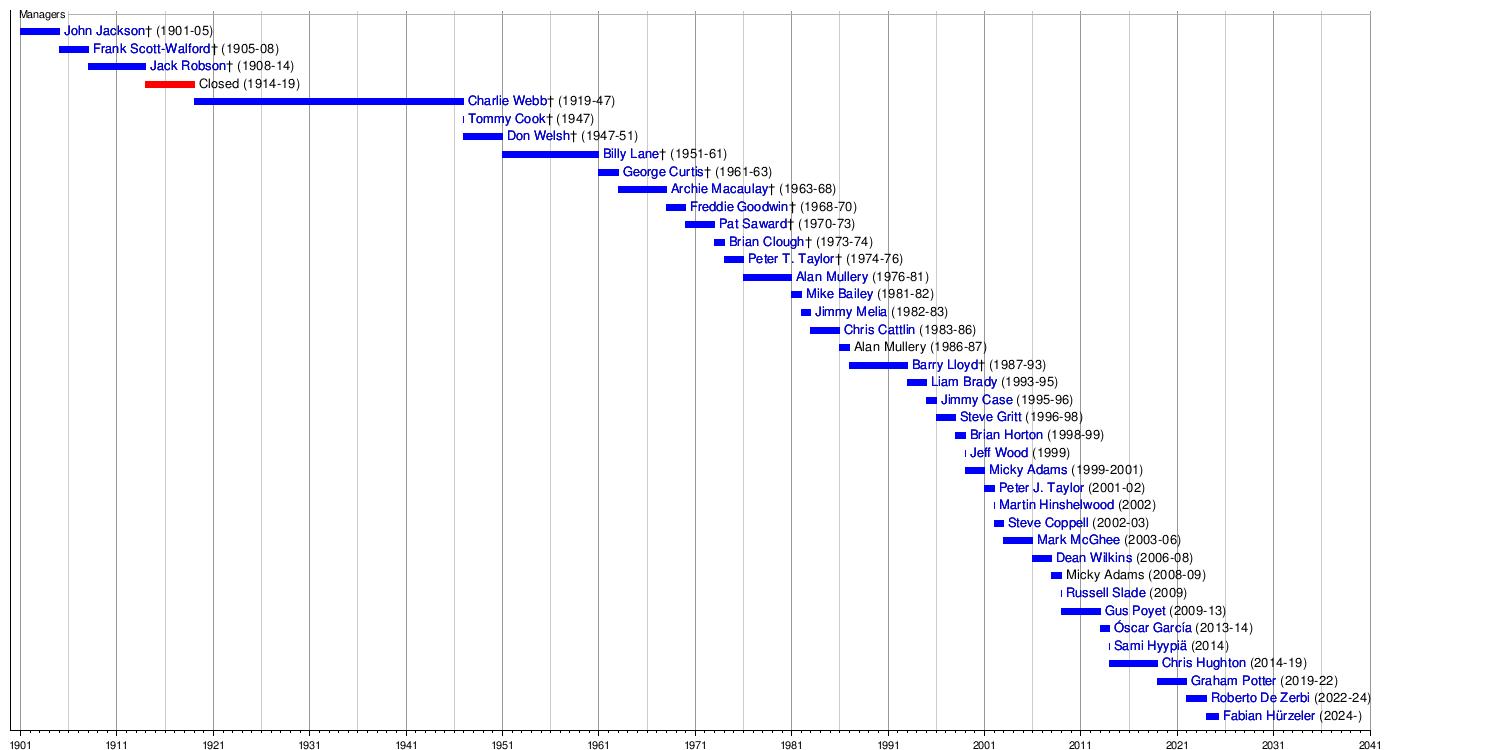
Club Management
Brighton & Hove Albion has a team of people who manage the club.
First-Team Coaching Staff
Club Officials
| Board | |
|---|---|
| Chairman | Tony Bloom |
| Chief Executive & Deputy Chairman | Paul Barber |
| Finance Director | Lee Cooper |
| Chief Operating Officer | Paul Mullen |
| Non-Executive Vice Chairman | Peter Godfrey |
Club Honours and Achievements
Brighton & Hove Albion has won several titles and reached important finals throughout its history.
League Titles
- Second Division / Championship (Level 2)
- Runners-up: 1978–79, 2016–17
- Third Division South / Second Division / League One (Level 3)
- Champions: 1957–58, 2001–02, 2010–11
- Fourth Division / Third Division (Level 4)
- Champions: 1964–65, 2000–01
- Southern League
- Champions: 1909–10
Cup Competitions
- FA Cup
- Runners-up: 1982–83
- FA Charity Shield
- Winners: 1910
- Sussex Senior Challenge Cup
- Winners (15 times): 1942–43, 1987–88, 1991–92, 1993–94, 1994–95, 1999–00, 2003–04, 2006–07, 2007–08, 2009–10, 2010–11, 2012–13, 2016–17, 2017–18, 2021–22
- The Sussex Royal Ulster Rifles Charity Cup
- Winners: 1959–60, 1960–61.
See also
 In Spanish: Brighton & Hove Albion Football Club para niños
In Spanish: Brighton & Hove Albion Football Club para niños

